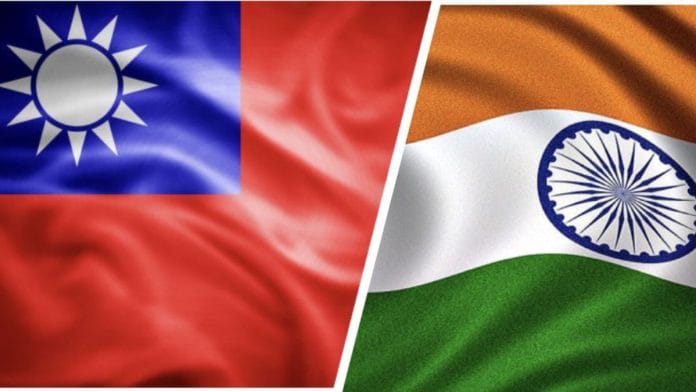India and Taiwan have made sustained efforts to advance their relations in recent times, actively working to strengthen ties and move beyond the sporadic nature that once characterised their relationship. A pivotal moment in the evolution of India’s Taiwan policy unfolded last week with the signing of a labour pact between the India-Taipei Association and the Taipei Economic and Cultural Centre. These offices serve as the countries’ de facto embassies in Taipei and New Delhi, respectively.
Reportedly signed after prolonged negotiations and discussions, this pact will allow Indian workers to seek employment in Taiwan, which is facing a labour shortage in areas such as manufacturing, construction, and agriculture.
As India’s approach toward Taiwan continues to mature, the overarching goal remains to sustain this positive momentum and cultivate deeper cooperation across various domains covered within the framework of their unofficial relations.
The labour pact is now slated for a thorough review in the Legislative Yuan. Beyond its symbolic significance, the pact holds immense potential in strengthening commercial linkages and foster closer people-to-people connections.
A mutually beneficial relationship
Currently, the Indian expatriate community in Taiwan – about 5,000 people – is predominantly engaged in white-collar professions. With the pact opening blue-collar employment opportunities for Indians, there exists a prospect for a notable increase in the Indian population in Taiwan. This demographic shift not only promises to deepen people-to-people ties but can also pique the Indian government’s interest in Taiwan.
Taiwan grapples with a significant labour deficit exacerbated by declining birth rates and an ageing populace, making this pact instrumental in mitigating pressing demographic challenges.
Strategically, many Indians continue to harbour apprehensions about Taiwan’s perceived riskiness, largely influenced by concerns surrounding the China threat. However, the anticipated increase in the number of Indians in Taiwan holds promise in fostering deeper familiarity with the island nation in India. This firsthand exposure has the potential to dispel existing misconceptions and nurture a more nuanced understanding of Taiwan’s geopolitical complexities among Indians.
Also read:
China factor in India-Taiwan relations
The prevailing narrative often connects India-Taiwan relations to the deteriorating India-China ties. However, it’s important to recognise that, while this factor could be considered influential, India’s foreign policy is guided by its own interests. Some may find it challenging to comprehend but India does not make all its decisions in response to China-related considerations.
Given the strained state of India-China relations and efforts to manage this challenging dynamic, New Delhi is striving to maintain a delicate balance between its engagement with Taipei and its adversarial relationship with Beijing. Currently, India is prioritising the enhancement of traditional areas of cooperation with Taiwan.
However, there’s considerable untapped potential in India-Taiwan relations, particularly in the realm of economic cooperation. Failure to prioritise the economic dimension of this partnership, mainly from Taiwan’s side, could impede the overall progress of bilateral relations.
Also read: India and Taiwan ink key agreement on labour cooperation
Shadow of China’s disinformation campaign
The growing rapport between India and Taiwan presents a challenge for China. New Delhi is often perceived as a counterbalance to Beijing and is also an important member of the Quad (with Australia, Japan and the United States). Naturally, China may harbour unease regarding the deepening ties between India and Taiwan. Taiwan, in its pursuit to diversify its external engagements, has broadened its outreach endeavours, aiming to reduce its reliance on China. India’s engagement with Taiwan aligns with its consistent approach of recognising the country as a crucial economic partner.
While China did not directly influence the India-Taiwan relations nor motivated the signing of the pact, it remains entwined with the politicisation surrounding the agreement. Last year, unverified claims suggested an influx of 100,000 Indian migrant workers into Taiwan due to the pact. It sparked widespread online protests against the agreement. Notably, many of these protests seemed to emanate from sources associated with China.
This issue has been extensively politicised in Chinese media and on various social media platforms. The Chinese edition of The Global Times accused Taiwan’s Democratic Progressive Party (DPP) of misleading the Taiwanese population about the pact. Disparaging remarks have been employed to propagate misinformation and manipulate the Taiwanese people, particularly those exposed to platforms like TikTok and other contentious sources. For instance, a Weibo account insinuated that the pact is DPP’s ploy to erode the cultural legacy of Chinese descent by promoting intermarriage between Taiwanese women and Indian men.
The long shadow of China’s disinformation campaign looms not just over Taiwan but also over the country’s ties with India, evident in the delay that occurred in the signing of the labour pact. China’s concerted efforts to spread disinformation can undercut the strides made in India-Taiwan ties. Both sides must devise strategic responses to effectively counter these tactics. China should not dictate India’s external engagement. Preserving autonomy in decision-making is paramount, and India and Taiwan must work together to combat disinformation and protect their interests from external interference.
Sana Hashmi, PhD, is a fellow at the Taiwan-Asia Exchange Foundation and George HW Bush Foundation for US-China Relations. She tweets @sanahashmi1. Views are personal.
(Edited by Zoya Bhatti)






